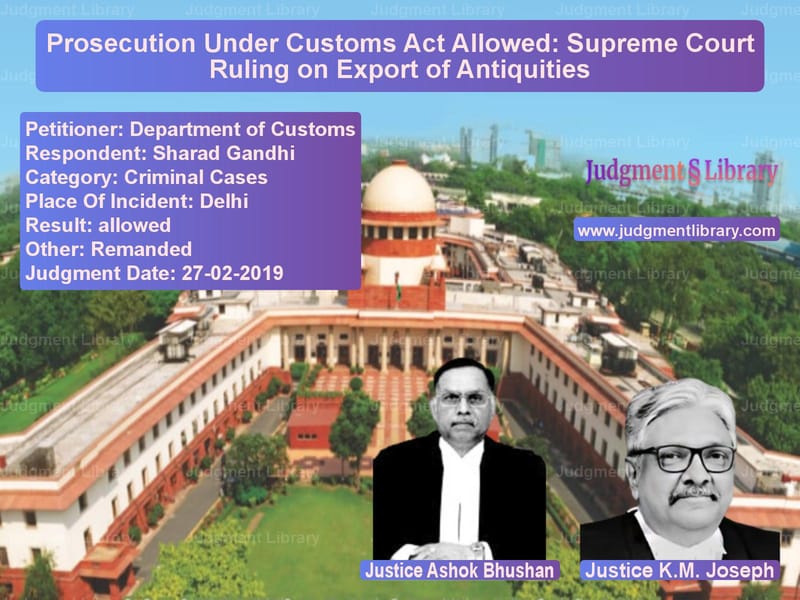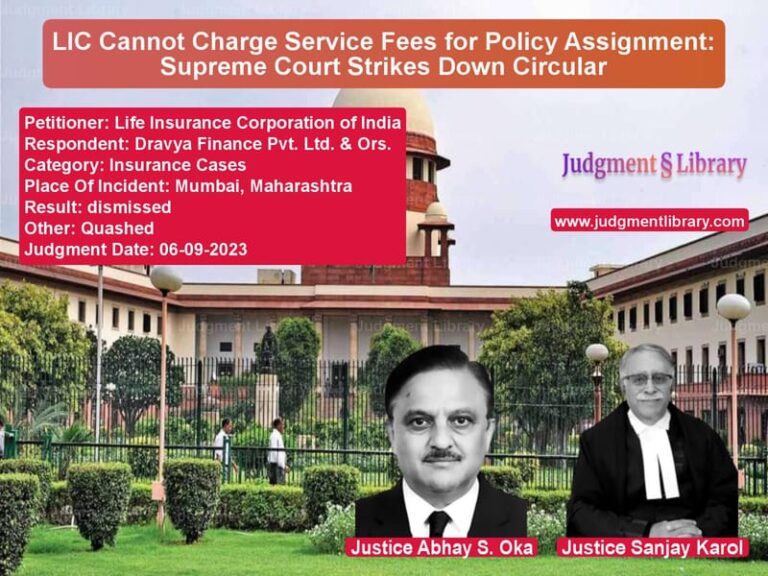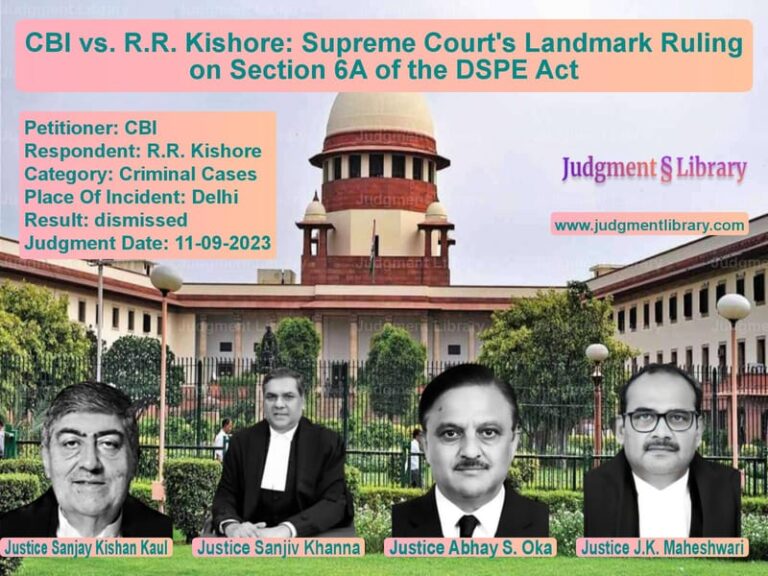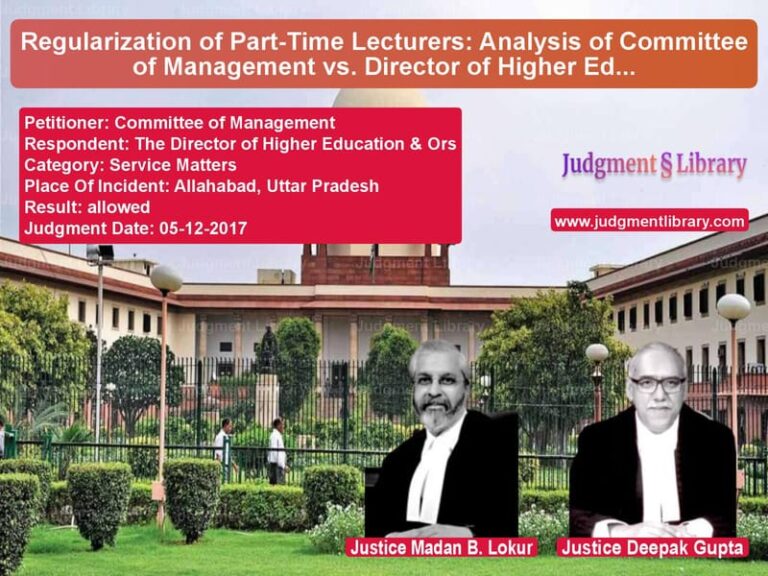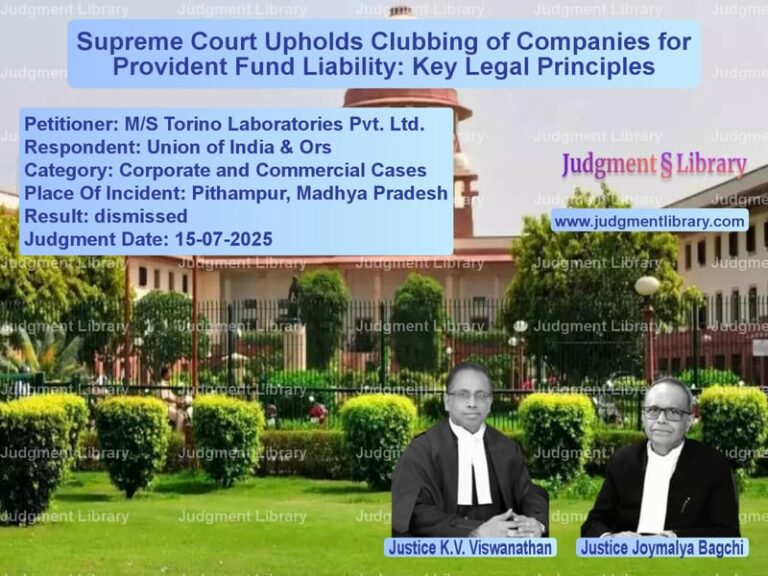Prosecution Under Customs Act Allowed: Supreme Court Ruling on Export of Antiquities
The Supreme Court of India recently delivered a significant judgment in the case of Department of Customs v. Sharad Gandhi, clarifying whether prosecution under Sections 132 and 135 of the Customs Act, 1962 is permissible in cases involving export of antiquities. The Court overturned the Delhi High Court’s ruling, which had earlier dismissed the prosecution against the respondent, stating that only confiscation and penalties under the Antiquities and Art Treasures Act, 1972 were applicable.
Background of the Case
The case arose when Customs officials intercepted a wooden box at a courier facility on February 18, 1995. The shipment was declared as ‘Stone Figure Handicrafts,’ but upon inspection by the Archaeological Survey of India (ASI), it was found to be an antique sandstone head of Buddha. The respondent, Sharad Gandhi, who had booked the shipment, was alleged to have attempted to smuggle the antiquity out of India in violation of Section 3 of the Antiquities and Art Treasures Act, 1972 and related provisions of the Customs Act.
The prosecution argued that the respondent had used a fictitious identity, prepared false invoices, and deliberately concealed the true nature of the goods to evade export restrictions. The Customs Department filed a criminal complaint under Sections 132 and 135 of the Customs Act, which penalize false declarations and fraudulent evasion of customs duties and prohibitions.
Legal Issues in the Case
- Whether prosecution under Sections 132 and 135 of the Customs Act is barred when an offense also falls under the Antiquities and Art Treasures Act.
- Whether the provisions of the Antiquities Act override the Customs Act, limiting the Customs authorities to confiscation and penalties only.
- Whether the Customs Act and the Antiquities Act can operate simultaneously in cases of illegal export of antiquities.
Arguments of the Parties
Arguments by the Department of Customs
The Additional Solicitor General appearing for the Customs Department argued:
- That the prosecution under the Customs Act was legally permissible, as Section 4 of the Antiquities Act specifically allows the application of the Customs Act unless there is a direct inconsistency.
- That the accused had knowingly engaged in fraudulent activities to export an antiquity, which is prohibited under Section 11 of the Customs Act read with Section 3 of the Antiquities Act.
- That prosecution under Sections 132 and 135 of the Customs Act was valid since the accused had misdeclared the goods and attempted to evade prohibitions on export.
Arguments by the Respondent
The respondent, Sharad Gandhi, countered:
- That the Antiquities Act is a special law, and under Section 25, it already prescribes punishment for illegal export, limiting the Customs Department’s powers to confiscation and monetary penalties.
- That the provisions of the Customs Act cannot be applied in cases where the Antiquities Act governs the offense.
- That the Delhi High Court had correctly interpreted the law in dismissing the prosecution under the Customs Act.
Supreme Court’s Observations
The Supreme Court examined the interplay between the Antiquities Act and the Customs Act. The key points noted by the Court were:
- Section 4 of the Antiquities Act explicitly states that the Customs Act shall apply to cases involving export of antiquities, except where inconsistent.
- Section 25 of the Antiquities Act allows for confiscation and penalties but does not exclude criminal prosecution under other laws, including the Customs Act.
- Section 135 of the Customs Act penalizes fraudulent evasion of prohibitions, which includes restrictions imposed by the Antiquities Act.
- The Court held that the accused had engaged in fraud by concealing the true nature of the shipment, and thus, prosecution under Sections 132 and 135 of the Customs Act was justified.
Key Excerpts from the Supreme Court Judgment
The Court made the following critical observations:
“The view we are declaring does not do violence to the provisions of Section 25 of the Antiquities Act. The contrary view which has gained acceptance at the hands of the High Court fails to give meaning and full play as intended to the Customs Act as provided in Section 4 of the Act.”
“One set of facts may occasion the committing of more than one offense. The key question to be posed and considered is what are the elements which make an offense under an enactment. A transaction may involve a person in the committing of two or more distinct offenses. This is neither contrary to Article 20 of the Constitution of India nor Section 300 of the Code of Criminal Procedure.”
Final Judgment
The Supreme Court set aside the Delhi High Court’s order and allowed the appeal filed by the Department of Customs. The Court ruled:
- The prosecution under Sections 132 and 135 of the Customs Act is valid and should proceed.
- The Customs Act and Antiquities Act are complementary and not mutually exclusive.
- The complaint against Sharad Gandhi may be prosecuted as per law.
Conclusion
This ruling is a landmark decision clarifying the jurisdiction of the Customs Act in cases involving the export of antiquities. The judgment ensures that individuals who attempt to smuggle heritage objects out of the country can be prosecuted not only under the Antiquities Act but also under the Customs Act. It reinforces the government’s commitment to protecting India’s cultural heritage and deterring illegal trade in antiquities.
Petitioner Name: Department of Customs.Respondent Name: Sharad Gandhi.Judgment By: Justice Ashok Bhushan, Justice K.M. Joseph.Place Of Incident: Delhi.Judgment Date: 27-02-2019.
Don’t miss out on the full details! Download the complete judgment in PDF format below and gain valuable insights instantly!
Download Judgment: Department of Custom vs Sharad Gandhi Supreme Court of India Judgment Dated 27-02-2019.pdf
Direct Downlaod Judgment: Direct downlaod this Judgment
See all petitions in Fraud and Forgery
See all petitions in Money Laundering Cases
See all petitions in Extortion and Blackmail
See all petitions in Judgment by Ashok Bhushan
See all petitions in Judgment by K.M. Joseph
See all petitions in allowed
See all petitions in Remanded
See all petitions in supreme court of India judgments February 2019
See all petitions in 2019 judgments
See all posts in Criminal Cases Category
See all allowed petitions in Criminal Cases Category
See all Dismissed petitions in Criminal Cases Category
See all partially allowed petitions in Criminal Cases Category

